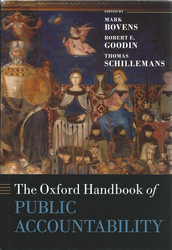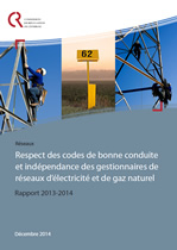Feb. 16, 2015
Bibliographic Reports : Books

Published by Oxford University Press (OUF), the collective book, Public Accountability, edited by Mark Bovens, Robert Goodin and Thomas Schillemann, consists of 43 contributions.
Few strictly focus on issues of regulatory matters. One can still quote the article by Colin Scott on Independent Regulators or those of Christie Hayne, Steven E. Salterio and Paul L. Posner and Shahan Asif on auditing (Accounting and Auditing; Audit Institutions).
The subject of most of the contributions is rather the necessary renewal of the management of the State, public governance incorporating this new way of "accountability," which explains the book title : itself: Public Accountability. But as we know that the line between public and private is more porous than ever, we can appreciate that the bookk extends its thoughts to the governance of private organizations or non-profit private sector by some contributions.
Indeed, the fact that Accountability is what is common to the Regulation and Governance. This is the first sentence of the book : "Accountability is the buzzword of modern governance".
Probably because of accountability has become a central concept, as shown in the introductory contribution, these are the articles that confront the most general elements such as "time" (Accountability and Time), "crisis" (Accountability for Crise) or "trust" (Accountability and trust), which are the most instructive for the future.
Thus, despite its collective character, the book is very consistent and often takes a critical tone about this invasion of public space by the will of accoutability, the authors emphasizing the "deficits", the failures and especially thet prohibitively expensive of this mechanism.
It would come to regret the simple mechanism of hierarchical rule to which a nostalgic contribution is devoted, which describes how operated the State before we apply to it the State the agency theory.
So it is a practical book, complete, critical and prospective, of great interest.

Jan. 10, 2015
Sectorial Analysis


Jan. 8, 2015
Breaking news

The French law provides that the Commission de Régulation de l'Énergie - CRE (French Regulatory Energy Commission) publishes an annual report on compliance with codes of conduct and independence of the power transmission grid operators. In Decembre 2014, CRE has published its report on compliance with codes of conduct and independence of electricity networks and natural gas (Respect des codes de bonne conduite et indépendance des gestionnaires de réseaux d'électricité et de gaz naturel).
This particular statutory provision shows the proximity between Regulation and Governance, nearby sometimes believed limited to the sphere of banking and finance.
This is designed especially for managers of transport networks which are often subsidiaries of incumbents production and energy sales, economic and legal integration that the law does not prohibit even though it requires independence transport network managers. This independence must be de facto and not de jure, which is a higher requirement than mere legal autonomy of companies, the result of the requirements of "governance", the operator is obliged not to exercise the rights and powers its parent company status yet gives a regular basis so that the first principle of independence of the network manager is preserved.
The relationship between the controlling shareholder and its subsidiary are governed by "codes of conduct" in the mandatory order of the independence of management and decision making of the subsidiary. In a 90-page reportthe regulator sets the constraints so that this goal leads in effect on the parent company, beyond corporate law.
However, the regulator is very severe. It believes that the way in which subsidiaries present themselves to consumers mark such similarity with their parent that these third parties can't identify them as independent of them. According to the regulator, consumers therefore don't identify them as carriers or distributors of energy also offered by competitors of their parent.
Thus, the regulator considers it necessary that these subsidiaries will change their brands, logos and legal designation, eg ERDF ceases to have a name so close to EDF.
The implicit question is the legal effect of such reproaches and suggestions, if the companies aren't listening. The report discusses the prospect to bring the question before their independent body able to impose sanctions. But the case will be difficult because the principle of independence meets the principle of freedom and the terms of the interference between regulatory law and corporate law aren't yet clearly established.
Dec. 1, 2014
Thesaurus : Doctrine

Complete Reference : BOVENS, Mark, GOODIN Robert E., SCHILLEMANS, Thomas (ed.), The Oxford Handbook of Public Accountability, Oxford University Press, 2014, 682 p.
Read the presentation of the Collin Scott's contribution : Independent Regulators.
